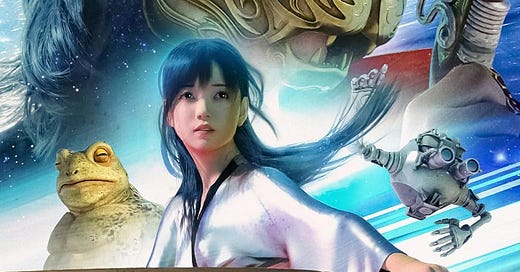Book Review: Starquest: Space Pirates of Andromeda, by John C. Wright
Making Star Wars great again.
When John C. Wright saw Star Wars: The Force Awakens, he had a different view than what we saw.
His review of the movie is what we were promised, as opposed to what we got.
The end result of this shot-from-the-hip mock review came an outline of a twelve-book series. You can read it without much in the way of spoilers. The story grew exponentially as time went on, with the addition of many, many more space pirates.
The Story
A long time ago, in a galaxy far, far away…
To begin with, Alderaan was destroyed…
No, sorry, wrong opening.
The despotic Galactic Empire has fallen. The Dark Overlords, masters of mysterious mental powers, are dead. The remnants of the Imperial forces have retreated to the Black Sun Nebula at the core of the galaxy, brooding on revenge.
The Republic is reborn, and with it, truth, liberty, and hope. But from the ashes of the quenched tyranny, new evils arise!
One by one, an unknown force is extinguishing the life-giving suns throughout the arms of the galaxy, leaving billions to die in darkness.
Princess Lirazel Centauri (or simply “Lyra”) watched her world, and her die. They went down battling the forces of darkness. And despite everything she personally witnessed, no one will believe that the Galactic Empire was behind it—the Empire and its overlords were all dead.
And that’s just the thirty-page prologue.
Thirteen years later, Star Patrol Captain Athos Lone (not Solo, Lone) is boarding a pirate vessel, reading to exterminate the vile scum. He has a high tech mask from the ancient times that helps him be on par with a whole ship filled of pirates. When he finds himself on the hull, he discovered a translucent maiden with a bow and arrow just striding along the vacuum of space.
Lyra has learned a few tricks since her planet was destroyed.
From here is a breakneck run for survival against a horde of pirates, all out for Athos’ blood.
Think about the pacing of the original Star Wars: A New Hope. We open with a space shootout, follow two droids down to Tatooine, then the film slows down as the droids wander over the sands.
Space Pirates of Andromeda has no such slow down. It doesn’t stop to breathe. Like the original serials that Star Wars was based on, the plot is always moving, and the threats are omnipresent. The pacing is on par with Flash Gordon or a Barsoom novel.
And the prose is … well, it’s John C. Wright. His narration is poetry, no matter who’s being chased, stalked and / or shot at. It’s also very clear that Wright wanted to take a stiletto to the woke nonsense of “modern audiences.” Everyone is lovingly described. The heroes are heroic. The villains are villainous. you know, like most fiction.
The reason this review is so late, despite having an early review copy, is … well, the ending was very much like a Flash Gordon serial. Complete with a cliffhanger. The sort of cliffhanger that was fine if the next chapter came out next week, not months later. What do I mean? Imagine if The Empire Strikes Back stopped with TIE fighters chasing the Millenium Falcon into the clouds, and Luke Skywalker just dangling over Bespin, and everything just cut to credits… Yeah, that sensation right there? That was me when I first read it.
However, book two is out, I read it, it’s fun, so you can go straight from book one to book two.
The Characters
It you imagined the next generation of the rebels from Star Wars as more akin to superheroes, living up to the shadows of their parents … you pretty much have an idea of the characters.
And it’s John C. Wright. Even the bit characters have personality, backstory, and motivations, and they’re all relevant to the story.
The World
Despite how I’ve written it thus far, lest you think this is a bit if rewritten fanfiction retread, Wright has rewritten so much of Star Wars I want him to go back and give us the Starquest version of every episode before this. Everyone now has different background. Chewbacca looks more like Doctor McCoy from X-Men. There are conversations about the rise of this Empire, which rose in response to pirates, barbarians, “unholy things from Beyond the Edge, doppelgangers and underdwellers.” The ancient order of the Templars (not the Jedi) are freeing mutinous robots.
There is clearly a large world stuck in Wright’s head, and it has multitudes of planets swarming in there, each with their own distinct cultures.
How does Wright pull this off while keeping a breakneck pace akin to a thriller? Mostly by bringing up what’s relevant as it becomes relevant. And try not to breathe too deeply along the way.
Politics
Pirates bad. Evil should be crushed… um. That’s it.
If you think religion is just hokey superstition, you might have some issue. But this is a science fantasy in space. If you have problems with all that, you may be reading the wrong review.
Content Warning
Oh, the content is about as harsh as a Flash Gordon serial. Which is tame by the standards of some modern cartoon.
Who is it for?
Imagine Gene Wolfe writing Star Wars. If that sounds like fun, you’re the target readership for this book.
Why buy it?
When I first encountered the David Weber’s Honor Harrington series, it was described as “Horatio Hornblower meets Star Wars.”
If David Weber is the CS Forester of of science fiction, then that makes John C. Wright sci-fi’s Patrick O’Brian.
Upstream Reviews is a reader-supported publication. To receive new posts and support our work, consider becoming a paid subscriber.





I recently picked up the sequel "Secret Agents of the Galaxy". Looking forward to reading it!